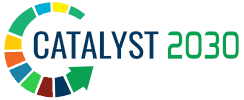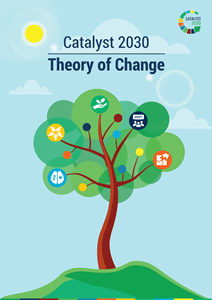A Journey Based Theory of Change
To develop Catalyst 2030’s Theory of Change a task force of Catalyst members analysed our current reality, built the future we would like to see and developed a pathway to get there. Download a detailed narrative of our Theory of Change and also our Pathways to Evaluation report.
Theory of Change Summary
What is our current reality?
Three powerful forces hold Catalyst 2030 back from significantly contributing to achieving the SDGs:
- Dominant culture: Much of the Global North and South are governed by a set of values and activities that focus on exploitation for short-term profit, unsustainable endless growth and benefits for individuals rather than collective prosperity.
- Inadequate conditions for collaboration: Many people and organisations working on the same issues are disconnected and there is little recognition of their interdependency. In many cases, systems create barriers to collaboration.
- Poor understanding of systems: Many people and organisations addressing the SDGs focus more on projects or programmes than on changing the underlying systemic conditions that uphold social and environmental problems.
The consequences of these factors for Catalyst 2030 are that many social entrepreneurs’ efforts remain subscale and underdeveloped.
What is our desired future?
For social entrepreneurs to significantly contribute to the attainment of the SDGs our desired 2030 future can be summarised as the roll-out of systems change across the world with attention to the following five elements:
- Widespread collaboration
- Measurement tools that support systems change
- Significant grassroots and community leadership
- Adequate support and recognition for social innovators
- Funding models that support systems change
What is our pathway to get there?
The foundation required to build the desired future involves accelerating collective action. Energising sufficient collective action will require focused efforts including the following:
- Supporting consciousness and cultural shifts: Societies would orient to a different set of values and behaviours. These include peace and justice supported by law, listening as well as talking, power shifts in favour of the traditionally marginalised, moving from hero-oriented to collaborative action and making spiritual awareness and inner wellbeing integral to the action.
- Strengthening political and community engagement: Government at all levels would be supportive of social entrepreneurs and include them in policy and decision-making processes.
- Strengthening systems level funding: Changes in funders’ structures, processes and behaviour would support collaboration and systems change approaches.
- Fueling collaboration: Catalyst 2030 would play a key role in supporting collaboration, networks and coalitions among social entrepreneurs and other stakeholders.
- Developing and using systems change tools: Success in collective action would be enabled by continued development, training and use of systems change tools.
Our journey based Theory of Change supports Catalyst 2030’s vision, mission, values, strategic approach and core principles.
Grounding for the Pathway to Evaluation for Catalyst 2030
The primary purpose of the monitoring, evaluation and learning (MEL) framework is to support the process of Catalyst 2030’s development and adaptation. The pathway is anchored on what members, leaders and staff are curious about regarding how to effectively catalyse change within social entrepreneurship and innovation systems to achieve the SDGs. We also suggest tracking impact, even early signals of impact, to inform ongoing development and provide accountability to funders, partners and other stakeholders.
To support this focus on learning without losing the importance of outputs and outcomes, we have taken a developmental evaluation approach. Developmental evaluation “supports innovation development to guide adaptation to emergent and dynamic realities in complex environments.” (Patton, 2010) The social entrepreneurship/innovation system is complex, characterised by a large number of interacting and interdependent elements in which there is no central control. Patterns of change emerge from fast, real-time interactions that lead to learning, evolution, and development. Developmental evaluation will support Catalyst 2030 leaders, members, and staff to observe and capture important and emerging patterns as the network grows.


